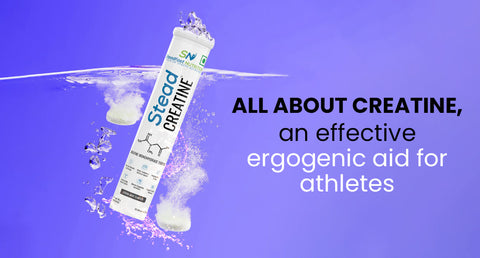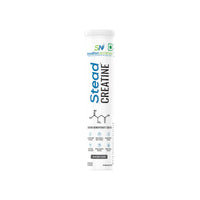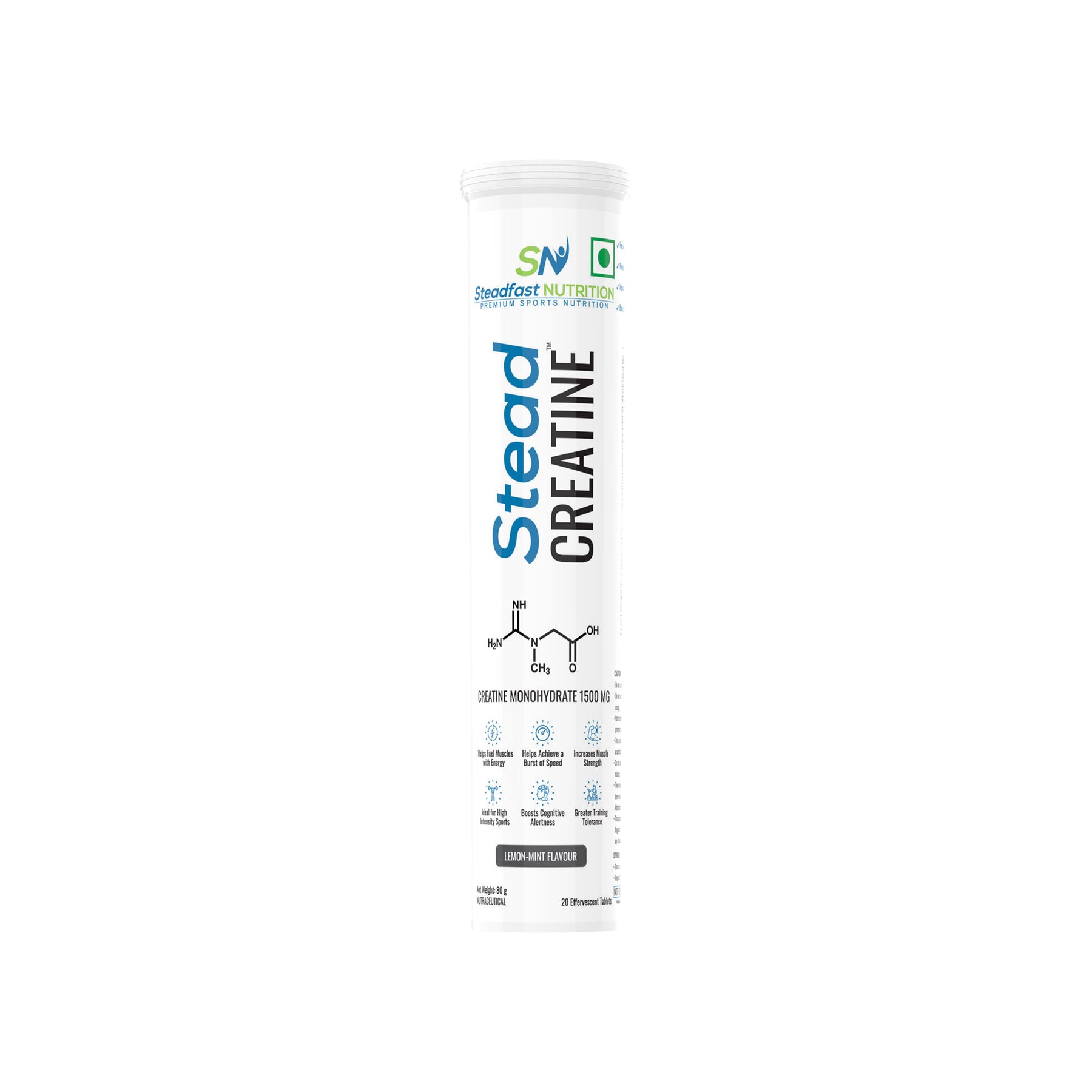All about Creatine, a Popular Ergogenic Aid for Athletes
Nowadays, many gym goers, sportspersons, and professional athletes have turned to a range of performance-enhancing supplements to ace the competitions, achieve more in their sports career and outlast the opposition. Creatine, the most well-known of these supplements, has been shown to increase muscle mass and strength and provides athletes with bursts of energy.
In the last few years, creatine supplements have created a buzz among fitness enthusiasts and professional athletes for all good reasons. Gym-goers are curious to learn and make the best use of this effective supplement.
What is Creatine?
Creatine is a naturally-occurring substance that the body produces from the amino acids glycine, arginine, and methionine in the liver, kidneys, and pancreas. After that, the blood carries it to the muscles, where phosphocreatine is stored and whose levels creatine increases. The high-energy substance phosphocreatine is essential for energy metabolism- ADP (adenosine diphosphate) is converted back into ATP (adenosine triphosphate)- a form of energy- when stored phosphocreatine donates a phosphate group to it. The main form of energy used by cells, ATP, is required for muscular contractions and fuels athletes during high-intensity sports like weightlifting or sprinting. The phosphocreatine system or creatine phosphate system is the name of this process.
Why Is Creatine Used?
As a dietary supplement, creatine is frequently used to boost athletic performance, increase muscle strength and power, and facilitate exercise recovery. The purpose of the supplement is to enhance athletic performance. It does this by maximising the availability of ATP, necessary for muscle contraction, and increases strength, power, and performance.
Additionally, creatine helps improve recovery and endurance. It may lessen muscular damage and inflammation, resulting in a quicker recovery and less discomfort. By boosting energy availability, it can postpone the onset of weariness after extended activity.
Does Our Body Contain Creatine?
The human body has numerous vitamins, minerals, and chemicals, some of which remain a mystery. Similarly, creatine is a substance found in our bodies. The pancreas, kidneys, and liver generate it naturally. The amino acids glycine, arginine, and methionine act as building blocks for the body's production of creatine. Creatine is produced in the body and then delivered by the blood to the muscles, where it is stored as phosphocreatine.
However, compared to the amounts obtained from dietary intake or creatine supplements, the amount of creatine naturally available in the body is low. Creatine levels in the body can be dramatically raised by eating foods high in creatine, such as meat and fish, or taking supplements, which may positively impact muscle health and performance.
How does Creatine Help the Body to Function?
Creatine, a naturally-occurring substance, is essential for the body's ability to regenerate energy, especially while engaging in strenuous physical activity. It is mostly stored in the muscles. Creatine's major job is to renew adenosine triphosphate (ATP), the main source of energy for cells- ATP is quickly depleted during strenuous exercise or any activity requiring short bursts of energy. By giving adenosine diphosphate (ADP) a phosphate group and turning it back into ATP, creatine aids in replenishing ATP storage. The enzyme creatine kinase is present during this process.
Creatine improves short-term, high-intensity performance, such as weightlifting, sprinting, and leaping, by increasing the availability of ATP. By assisting in the re-synthesis of ATP and delaying the onset of exhaustion, it can increase the ability to do numerous repetitions of high-intensity exercise.
Creatine and Muscle Growth
Creatine supplementation has been vastly researched for its possible benefits on muscle growth. While the major function of creatine is to replenish ATP stores and enhance energy production, it indirectly helps in muscle growth through various mechanisms. Here are some ways in which the energy maximiser helps build muscle.
1. Improved strength and performance: Creatine supplements like Steadfast Nutrition’s SteadCreatine have been shown to enhance strength and fuel performance while athletes, bodybuilders, and fitness freaks train. By providing muscles with energy, Creatine permits more intense and powerful workouts and can improve the stimulus for muscle growth.
2. Better protein synthesis: The supplement has been found to increase the expression of certain genes involved in protein synthesis, leading to an up-regulation of muscle protein synthesis, which can contribute to muscle repair and growth following exercise. In cultures of differentiating skeletal muscle, creatine has been demonstrated to boost the rate of production of two key contractile proteins- actin and myosin heavy chain, selectively.
3. Cell volumisation: The energy maximiser has a hydrating effect on muscle cells, resulting in rise in water content and cell volumisation (swelling up of cells), which can produce an improved anabolic environment for muscle growth, stimulating protein synthesis.
4. Increased anabolic hormone levels: Some studies suggest creatine supplementation can elevate anabolic hormones like insulin-like growth factor 1 (IGF-1), which is important for muscle growth. However, the studies on this subject are limited as of now.
5. Reduced muscle protein breakdown: The anti-inflammatory effects of creatine may help reduce the breakdown of muscle protein. Creatine can provide a positive net muscle protein balance, support muscular growth, and preserve muscle protein.
How does Creatine Effect Performance?
Creatine supplementation has been extensively studied for its effects on performance, particularly in activities that require short bursts of high-intensity effort. Here are some ways in which creatine can influence performance:
1. Increased ATP availability: Refilling ATP reserves depends heavily on creatine- it helps regenerate ADP into ATP, the main energy source for muscle contractions by contributing a phosphate group. Increased creatine levels enhance performance in sports like weightlifting, running, and leaping by allowing more ATP to be created and used more quickly during exercise.
2. Enhanced anaerobic capacity: Short-duration, high-intensity exercises that depend on anaerobic metabolism have been found to benefit from creatine supplementation in terms of performance, which includes exercises like weightlifting, jumping, and sprinting. Creatine helps prevent fatigue by promoting the quick synthesis of ATP, which enables people to sustain higher power output for longer periods.
3. Increased strength and power output: Creatine supplements have been shown to significantly improve strength and power output in numerous trials, leading to better results in exercises requiring explosive movements, like weightlifting, a type of resistance training. Individuals who have higher strength and power may be able to lift bigger objects, complete more repetitions, or exert more force.
4. Faster muscle recovery: Creatine may help muscles recuperate after strenuous activity. Creatine supplements may help in quicker recovery between exercise sessions by promoting ATP re-synthesis and creating energy, which minimises muscle damage and inflammation. Individuals may be able to train more regularly and sustain larger training loads, improving overall performance.
5. Effects on endurance performance: While short-duration, high-intensity activities are the main uses of creatine, some research has also looked at its impact on endurance performance. Despite conflicting findings, some studies suggest taking creatine supplements may enhance specific endurance performance characteristics, such as the capacity for repeated sprints or the length of time it takes to exhaust oneself during high-intensity sports.
Creatine Effects on Brain
Many trial studies conducted across the globe suggest creatine may help improve brain health, including cognitive function and healing from minor or major trauma. Brain cells use ATP when performing strenuous activities- creatine supplementation has the potential to increase phosphocreatine stores in the brain, escalating ATP production. The supplement may also enhance dopamine levels, improving brain function and minimising signs of tiredness and fatigue.
Some clinical studies in neurological conditions such as Parkinson’s Disease suggest that creatine may have an antidepressant effect; early clinical studies in depressive disorders—especially major depressive disorders show creatine might have a major role as an antidepressant.
Other Health Benefits Of Creatine Supplementation
In addition to its well-known effects on performance and muscle-related benefits, creatine supplementation has also been associated with several other potential health benefits. Creatine may help reduce blood sugar levels and fight diabetes. It is safe and easy to use.
There is merging evidence suggesting that creatine may have more positive effects. However, more fact-based studies are needed to back the claims.
Best Time To Take SteadCreatine Supplement
Experts are currently debating the ideal time to use creatine. However, most research studies indicate creatine is most effective when taken 30 minutes before or after a workout.
Some Adverse Effects Of Creatine
Creatine supplements are widely considered safe and well-tolerated among healthy individuals when used as per the daily recommended intake of upto 3 g/day. However, overdosing or pre-existing medical or health issues may cause some adverse effects, such as dehydration, kidney stress, gastrointestinal distress, muscle cramps, and weight gain. Creatine supplements shouldn’t be taken by individuals suffering from kidney and liver diseases. Individuals on creatine supplement should have adequate water.
In a Nutshell
One should not use creatine supplement as a substitute for regular and proper nutrition, training and recovery methods. Supplementation is most beneficial when clubbed with a well-balanced exercise program and a proper diet.
Moreover, if you are in search of the best creatine supplement, SteadCreatine, from the house of Steadfast Nutrition can be your ideal choice. We are trustworthy because we curate organ-friendly and premium products.



 Buy Now
Buy Now